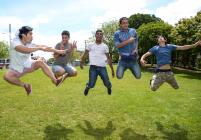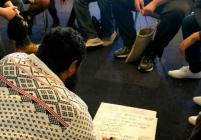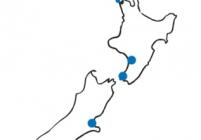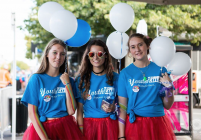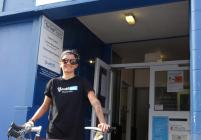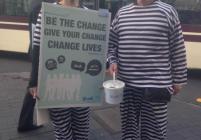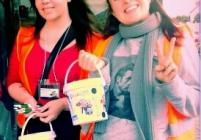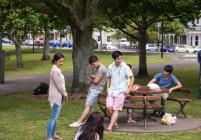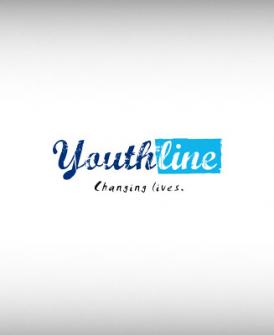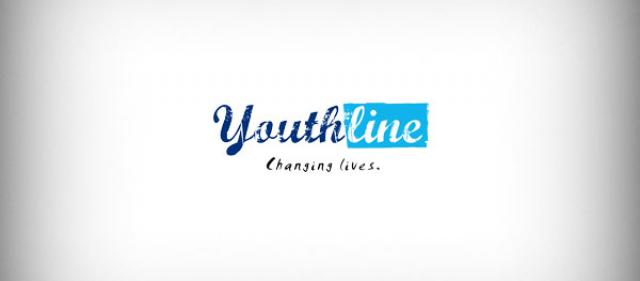FAQs for Students
We get a lot of requests from students researching assignments on Youthline which is awesome - we really like to be able help out, so in order to make sure we can assist all those who contact us wanting info about our organisation, we have prepared some FAQs below.
FAQs for Students
We get a lot of requests from students researching assignments on Youthline which is awesome - we really like to be able help out, so in order to make sure we can assist all those who contact us wanting info about our organisation, we have prepared some FAQs below.
Topics in this section:
- When was Youthline started and why?
- What is the structure of Youthline as an organisation?
- How do people become volunteers and what is the training involved?
- How is Youthline funded?
- How many calls/TXTs do you receive per year?
- What are the main issues young people contact you about?
- Is Youthline's helpline nationwide?
- Does Youthline belong to any international bodies?
- How many people work at Youthline?
- How often do jobs become available and how can I find out about them?
- What makes working with young people different from working with other groups?
- What theory informs the YL services?
Youthline was proudly established in 1970 by a group of people who realised that there were not a lot of options for young people needing to access health and development services. Youthline actually grew out of local initiatives based in communities around the country, with a common service linking us – the youth helpline. Since then, some of our services have expanded in different regions to include a range of other supports for young people. To find out more click HERE to find a local centre.
Youthline is made up of separate legal entities (with their own structures – a mixture of charitable trusts and incorporated societies) based in different regions of the country.
Organisations using the name ‘Youthline’ began popping up from the 1970’s around New Zealand but it wasn’t until the 1990’s that they began to work more closely together. This was largely due to new technologies that allowed Youthline to establish one helpline and a 0800 service that could be answered in different parts of the country – allowing all centres to come on board and work together more closely.
The Youthline organisations are now joined together by a Memo of Understanding that states how each centre will work together to provide our common services – the Youth helpline suite of services. Each centre provides helpline coverage, and some centres provide other additional services (for example in some areas, centres provide face to face counselling, mentoring services, youth development programmes and many others).
To read about each individual centre’s background click HERE
To read about the services that each individual centre provides click HERE
There are many ways to volunteer with Youthline, and we are always looking for people with a range of skills to help us out.
On the helpline (phone/TXT/email support) we are after volunteers who have good listening skills, are compassionate and non judgmental. Helpline trainings are held in each Youthline centre, with intake taking place several times each year. The training involved usually takes about six months to complete before counsellors are able to roster on for independent shifts. Once the training has been completed, counsellors are expected to roster on for shifts each month and attend regular supervision.
We also need a variety of other volunteers to cover the many other things we do.
If you want to find out more about what it is like to be a volunteer, what sort of people are volunteers, or what is involved, click HERE to go through to your local centre.
Youthline's funding comes from three key funding areas. These are, Grants and Philanthropic Donors (approximately 60%), Partners and Sponsors (appproximately 20%) and general fundraising, including individual donors, peer to peer fundraising and events (approximately 20%).
We get about 40,000 calls a year to our helpline, and receive around 200,000 text messages.
Youthline gets contacted about all sorts of things. Most common to our helpline and TXT service are people wanting to discuss relationships that they might have (whether it's friends, family, boyfriends/girlfriends), feeling down or depressed or just wanting to seek some advice about what to do in the future.
Yes, our helpline services are available throughout New Zealand. There are also Youthline centres in Palmerston North, Wellington, Christchurch, Dunedin and Invercargill. In Auckland we have premises in Manukau, Albany and Waitakere.
Yes, two of Youthline’s leadership team are members of Child Helpline International an international membership body that represents helplines across the world, and is based in The Netherlands.
From Youthline, Amber Davies is the Deputy Regional Representative for Asia Pacific and Nao Guy sits on the New Technologies Advisory Council. Youthline meets overseas with CHI members several times per year, and has been asked to assist in training and set up of helpline services in places such as South Africa, Malaysia and various Pacific Islands.
Approximately 100 full time paid staff across the country and 500 helpline volunteers throughout New Zealand. Many more volunteer at Youthline events and help out in our offices or on projects throughout the year.
Paid jobs become available from time to time at Youthline centres around the country. To find out about them, click here to view all current situations vacant.
The young people that come to Youthline for support present with a number of different strengths and struggles. No young person is the same and this makes working with them both challenging and rewarding. Youth are defined as young people between the age 12 and 24 and this is a time where there are a lot of changes occurring physically, mentally and emotionally. These changes can bring challenge but also opportunities for growth and expression. Some young people are still living at home or attending school and this may mean that they feel bound by their parents or caregivers as well as feeling unsure about what they are studying and the direction they are going in. Lots of young people find themselves asking big questions like “Who am I?” and “What do I want to do with my life?”. Youthline can help by working alongside the young person to explore some of these questions, and help them to reach a space where they feel supported, safe and confident to go into the world as resilient young people who are well-resourced and able to make decisions about issues that affect them. Sometimes the media representation and society’s perception of young people isn’t always positive; this can have impact on young people’s perception of themselves and sense of belonging in the wider community. Working with youth is all about helping them to build connections with their families, peers and community and this means working alongside them, acknowledging them and reassuring them too.
Utilising a wraparound approach and informed by research Youthline provides services in six key areas: Early Intervention & Information Services, Counselling Services, Youth Work Services, Training & Development, Research & Policy Development, and Social Enterprise Activities. Youthline works from a person-centred and strengths-based framework, and takes a holistic, wrap around approach to working with youth, which can include other therapy modalities such as Cognitive Behaviour Therapy, Dialectical Behaviour Therapy, Family Therapy Narrative Therapy, Sandtray work and psychoanalytic psychotherapy. This approach recognizes the individual needs of young people within their social, cultural and community environments. A key component of Youthline’s service delivery is flexibility, which allows young people and their families to engage with aspects of service that are most relevant to their current needs. The Youthline House Model (YHM) is a flexible integrated model which means that packages of service are tailored to each individual, and the client can choose to engage with all or part of the package. This flexibility allows young people to feel empowered and take bite size pieces of service that suit their needs and life stage.
Youthline provides a supportive & trusted place where young people can express themselves, be responded to & referred to specialist services. Our work is crucial to building young people’s resilience to cope with risks later in life, by working towards outcomes such as strategies for managing feelings, community links and support, entering into study/work, identified support systems, decision making, improved communication skills, increase self-care, anger management skills, stress management, processed grief & relationship improvement.
Being a youth development organisation, Youthline is also guided by the six principles of the Youth Development Strategy Aotearoa.
- Youth development is shaped by the big ‘picture’. This means that as an organisation Youthline recognises the whole person and the systems and influences that exist that shape young people’s lives.
- Youth development is about young people being connected. Youthline recognises the importance of positive connections and strives to provide these through all aspects of our services, whether this is through information resources, text or phone counselling, or face to face and community connection one on one with a counsellor or youth worker.
- Youth Development is based on a consistent strengths-based approach. Youth development from a strengths-based approach is the cornerstone of all the work that Youthline does.
- Youth development happens through quality relationships. Youthline provides friendly and specialist services through counsellors, youth development workers and support centre staff, ensuring that young people are fully informed, well supported, and have trusted people on their side.
- Youth development is triggered when young people fully participate. Youthline works alongside young people to come to their own solutions, making them an active participant in their own development, rather than just a passive recipient of services.
- Youth development needs good information. Youthline undertake several research projects every year to ensure we are providing best practice and that our services are useful, helpful and relevant to young people and their families.
Need to talk to someone?
Kia ora - tamariki ma
Contact us, we are here to help!




